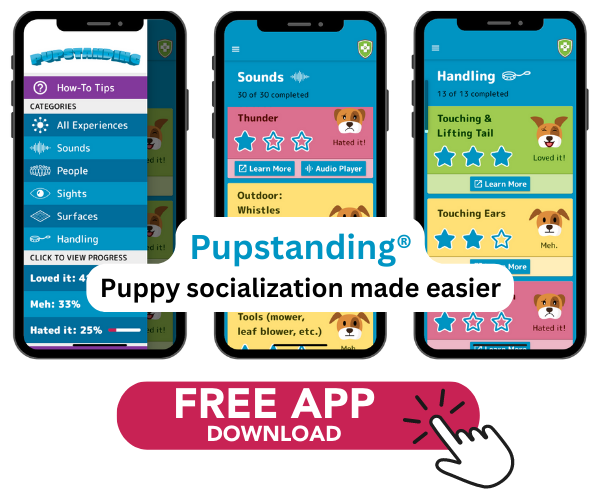 Bringing a new puppy home is a thrilling experience, and you're probably eager to start bonding with your new bundle of fur as soon as possible. But be sure not to rush things!
Bringing a new puppy home is a thrilling experience, and you're probably eager to start bonding with your new bundle of fur as soon as possible. But be sure not to rush things!
One important thing to keep in mind is when puppies can leave their mother and littermates. You want your puppy to have the best start in life because it matters later on.
The timing of when a puppy leaves their mother can have a significant impact on a puppy's socialization, behavior, and overall health.
If you're getting your new puppy from a reputable breeder or rescue organization, they will make sure that the puppies stay with their mom and littermates for the correct amount of time to prevent future behavior or health issues. There can be reasons for separating a puppy early, but those are few and far between.
How Long Should a Puppy Stay With Their Mother?
How Long Do Puppies Nurse?
Puppies typically nurse from their mother until 8 weeks old. During this time, they receive essential nutrients and antibodies from their mother's milk (called colostrum), which helps strengthen their immune system and support healthy growth.
As the puppies grow, they start to explore solid food at around one month old, transitioning away from relying solely on their mother's milk. The weaning process involves gradually introducing them to a combination of soft puppy food and milk replacer, allowing them to adjust to a new diet gradually. Typically, puppies are on a solid food-only diet between 7 to 10 weeks old.
But nursing isn't just about providing food. It's an important bonding moment between mother, puppy, and siblings. Nursing mother dogs release a dog-appeasing pheromone (DAP), also known as apasine, starting a few days after birth and until a few days after weaning. This pheromone helps reduce stress and increases the bond between the puppies and their mother. There are synthetic versions of DAP, like this ThunderEase diffuser, that you can use to help reduce stress for your puppy as they acclimate to their new home with you.
 Can Puppies Leave Their Mother Before 8 Weeks Old?
Can Puppies Leave Their Mother Before 8 Weeks Old?
Puppies should not leave their mother before they are 8 weeks old. These first 2 months of life are crucial for their growth and development. During this period, puppies learn vital social and behavioral skills from their mother and littermates. They learn appropriate play, bite inhibition, and communication through interaction with their siblings. Separating them too early can hinder their socialization, increase the risk of behavioral issues, and contribute to potential health problems.
Puppies receive vital nutrition and immunity from their mother's milk, which aids in their physical development and helps strengthen their immune system. At 8 weeks old, puppies are able to rely solely on solid food and no longer need their mother's milk.
In some states, it is against the law to sell puppies under 8 weeks old. If you see a puppy available for sale who is not yet old enough to leave their mother, that is a huge red flag and likely means they are from a puppy mill or backyard breeder. See this overview of state laws regarding the sale of underage puppies to see what your state mandates.
What's the Best Age for Puppies to Leave Their Mother and Littermates?
It's best to keep a puppy with their mom and litter until they are at least 8 weeks old, but more breeders are starting to keep litters together until puppies are 10 to 12 weeks old. This provides a few extra weeks for crucial dog-dog interactions with siblings and their mother. A breeder may also continue to incorporate socialization experiences, such as different sights, sounds, textures, and more that the puppy is likely to experience later on in life.
But longer than 12 weeks is not necessarily better. If you have siblings, you may understand that having them around for too long tends to wear on your nerves. Plus, a puppy needs time to bond with their new family, which is best started before their critical socialization period ends around 16 weeks old.
Reasons a Puppy May Leave Their Mother Early
Certain situations may arise that make it necessary for puppies to be separated from their mother or siblings earlier than recommended. For instance, if the mother rejects her puppies or is unable to care for them due to illness or injury, they may need to be hand-raised.
Similarly, if there are behavioral issues between littermates that could lead to aggression or harm, they may be separated early.
In these scenarios, it's essential for caretakers to provide proper support and care to ensure the puppies still receive the nutrients, socialization opportunities, and behavioral guidance they need.
This includes providing appropriate food and nutrition, socializing them carefully with other dogs, and incorporating training to address potential behavioral issues. This is similar to what puppy raisers need to provide for "singleton" puppies (a puppy who has no littermates).
Risks to Puppies Leaving Their Mother Too Early
Once puppies no longer rely solely on their mother's milk for food, they enter a critical socialization phase where they continue to learn important behaviors and communication skills from their mother and littermates. This period, usually lasting until around 16 weeks of age, is crucial for their emotional and social development. It is during the first few weeks of the critical socialization period that a puppy begins to form bonds with their siblings, learn about canine interactions, and gain confidence in themselves.
Behavioral Issues That Can Arise After Early Separation
A puppy who leaves their mother and litter too early has a higher chance of developing the following behavioral issues:
- Inappropriate nipping and biting
- Not understanding canine body language cues
- Resource guarding
- Fear
- Separation anxiety or distress
- Aggression toward other dogs
Potential Medical Issues from Early Separation
Puppies separated too early are at risk of negative effects on their health, such as:
- Poor physical condition
- Trouble gaining weight
- Increased risk of illness due to a weakened immune system
- Higher mortality rates
 How to Help Puppies Who Were Separated Too Early
How to Help Puppies Who Were Separated Too Early
If you have a puppy who was, for whatever reason, separated from their mother and littermates earlier than 8 weeks, there are things you can do to help reduce the risk of behavior and medical issues.
Visit Your Veterinarian ASAP
Young puppies are already at risk of illness before vaccinations, and those who are separated too early are at an even higher risk due to their weakened immune system. Your veterinarian may recommend a Parvovirus-only vaccine if your puppy is 6 weeks old and will discuss with you the importance of ensuring a safe and clean environment.
If you have a toy breed young puppy, use extra caution as they are prone to hypoglycemia and may need a frequent feeding schedule.
Focus on Positive Exposure and Socialization
Early socialization is crucial for puppies who were separated from their mother prematurely. Exposing them to a variety of people, animals, and environments can help them develop confidence and positive associations.
You can practice socialization exercises while being careful to not put your puppy at risk of illness. Learn how to socialize your puppy the right way in "When and How to Start Socializing Your Puppy."
Enroll your puppy in puppy socialization and training classes or set up playdates with other puppies and well-behaved dogs once they've had their first round of puppy vaccinations. This will help them learn appropriate play behavior, develop canine communication skills, and reduce the likelihood of fear or aggression issues.
Socialization is best done under the supervision of a certified professional dog trainer or behavior consultant, especially with puppies who were separated from their mom too early.
Check out "Choosing the Right Puppy Class" for tips on how to know whether the class is right for you and your pup.
Train with Positive Reinforcement
Using positive reinforcement techniques can be highly effective in teaching a puppy proper behaviors. Reward-based training reinforces desired actions or responses by using treats, toys, or praise. Consistency and patience are key when training a puppy who was separated early.
Focus on teaching basic training skills, such as sit, stay, and come, along with addressing any specific behavioral issues they may exhibit, like excessive nipping or separation anxiety.
You want to avoid using outdated training methods, such as "balanced" training, or any trainer that uses aversive tools, such as shock collars, prong collars, or other punishment.
These things can cause increased fear and aggression, which you want to avoid at all costs with your dog. You can learn more about the risks of these methods and tools in "Dog Training Aversives: What Are They and Why You Should Avoid Them."
But above all — training isn't just for your dog to perform obedience skills or tricks. It's about building a relationship with your puppy and creating a clear line of communication built on trust.
This is imperative for puppies who left their mother or litter early. They need to know you've got their back and can trust you to not put them in situations they can't handle, as well as coaching them on how to cope in other situations that may be overwhelming.
Be Patient and Consistent
It's crucial to remember that puppies who were separated too early may require extra time and patience to overcome behavioral or medical challenges. Be consistent in your expectations, training methods, and routines.
Establish predictable routines for feeding, exercise, and playtime to provide them with stability. Additionally, provide a safe environment with appropriate chew toys, mental enrichment activities, and a designated space for relaxation when needed.
Being thoughtful about setting your puppy up for success will go a long way in preventing issues from developing due to their early separation from their mother.





